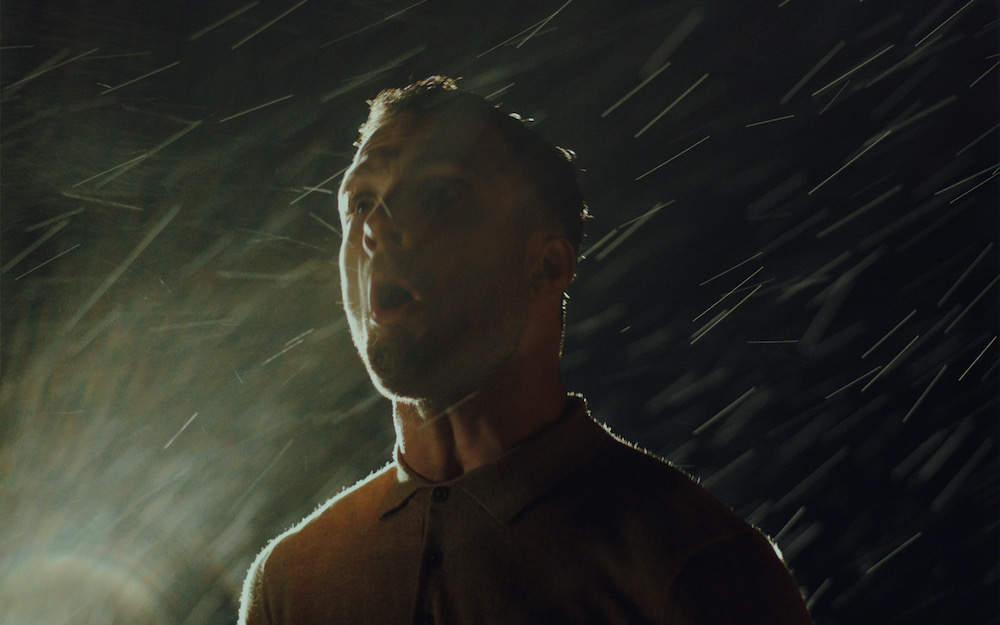Antonia Campbell-Hughes makes her writer/director debut with many striking choices in “It Is in Us All,” a narrative feature competition film from this year’s festival. Chief among them is to base the heart and soul of this brooding and compelling story on the physicality of Cosmo Jarvis, a visceral and gentle actor this side of Tom Hardy, who can share the rigidity of an old piece of furniture and present himself like he has just the same amount of history and wear. Jarvis continues to be one of the most compelling actors in his field; this story that largely has him occupying different intense spaces, while restraining years and years of emotion in the name of self-destruction, reckons with his on-screen power.
The script by Campbell-Hughes does not play lightly with trauma, in a way that is bold and then countered by a more meditative and restrained editorial approach. Not only has Jarvis’ Hamish Considine returned to the quiet island where his mysterious mother grew up, and possibly wanted to raise him instead of in London. But in the beginning of the film, Hamish gets into a devastating car wreck with his rental car, leaving one teenager dead. His mother’s empty and isolated home feels even more packed with grief, and Hamish’s situation is even more dire when it comes to getting food, and taking care. He becomes stubborn, self-destructive, tending to grotesque wounds with a makeshift splint while carrying himself with rigid posture. But then Hamish starts to receive visits from the other teenager who was in the crashed car, Rhys Mannion’s Evan, who initiates him in a strange way to life on the island, while this trauma sits between them. The dead boy’s mother Cara (Campbell-Hughes) also appears randomly to Hamish, filled with dread and anger during each interaction.
The story is compelling enough, even if there are some moments in which the emotional pacing can drag, but it is completed by gorgeous cinematography from Piers McGrail. “It Is In Us All” rightly won a special jury award (“Extraordinary Cinematic Vision”) for these compositions, which do wonders with static frames, camera placement, and ways to make the countryside appear imposing and gorgeous at the same time. Even the opening car accident is shot in a way that won’t leave your mind soon: instead of placing the camera in the car to watch it tumble, or just cutting to black, we instead see the car roll from one high corner of the frame to a low corner, letting its car lights guide us down through blackness. We get the impact of the crash that wouldn’t have come from a (reasonable) immediate cut to black, but we also get a striking way that only selectively uses light to pierce through the darkness. Hamish wrestles with light and darkness throughout Campbell-Hughes’ story, and the film’s mind for character and space makes for an intricately haunting debut.

Pete Ohs‘ “Jethica” is one of the stranger movies one might see this year about stalking ghosts, hitchhikers, and the gorgeous background of New Mexico, and that’s a good thing. It’s built from the type of off-kilter storytelling that goes from one sequence to the next with confidence and focus, evolving in front of your eyes without losing your attention. Sometimes it has the hum-drum of a ‘90s American indie; sometimes it has the uneasy, sinister air of a slasher movie. Director Pete Ohs makes clear that tone can evolve, especially when the story is as distinct, and original, as this.
With five writers credited writers, “Jethica” more or less concerns Jessica (Ashley Denise Robinson), and how she is being stalked by a guy named Kevin (Will Madden). Jessica has driven away from her home in California to New Mexico and runs into an old classmate, Elena (Callie Hernandez), who gives her a remote place to stay. But then Kevin shows up, though he looks strange. Elena knows more about what is going on, especially when she considers the ghostly history of her grandmother’s plot of land.
Ohs’ film tells this story with an established visual sense, using the same types of shots to lull you into a confident comfort. It’s a lot of slow pans, and edits that fade one image filled with negative space into the next, while a simple piano motif says more than enough when accompanied with casually gorgeous landscape shots of the purple New Mexico skyline. Atmosphere goes a long way in this sense, to create isolation, countered with the film’s characters who bring their own color and striking yet reserved performances. Nothing seems too, too out of the ordinary in this world, even though it is to us. It’s a striking combination that helps make “Jethica” all the more memorable. It’ll be interesting to see what Ohs does next, but we can be certain it will be the best kind of weird.

Reggie Yates’ lighthearted buddy comedy “Pirates” takes viewers back to December 31, 1999, the night of Y2K. Three rambunctious and close friends (Eliot Edusah, Jordan Peters, and Reda Elazour) decide to find their way to a big London Y2K party, but hit many problems along the way—including how to get tickets to the event that comes with its own mega-sized bouncer, and also how to not lose them. Set over one night and filled with fast-talking dialogue and in-your-face filmmaking, “Pirates” is a sugar rush of a movie that wants to have fun with an albeit familiar coming-of-age concept but charismatic cast.
“Pirates” can be an uneven balance of cheesy ‘90s comedy—references to the Backstreet Boys, or Tamagotchi toys—but it wins most with the chemistry of its three leads. They bounce off each other for the whole movie, joking and teasing and bonding, adding to an already bright visual palette, giving energy to many set-pieces. Sometimes they’re a little too cartoonish, as if playing for a laugh track, but the wackiness of “Pirates” nonetheless makes way for a warming tale of friendship.












